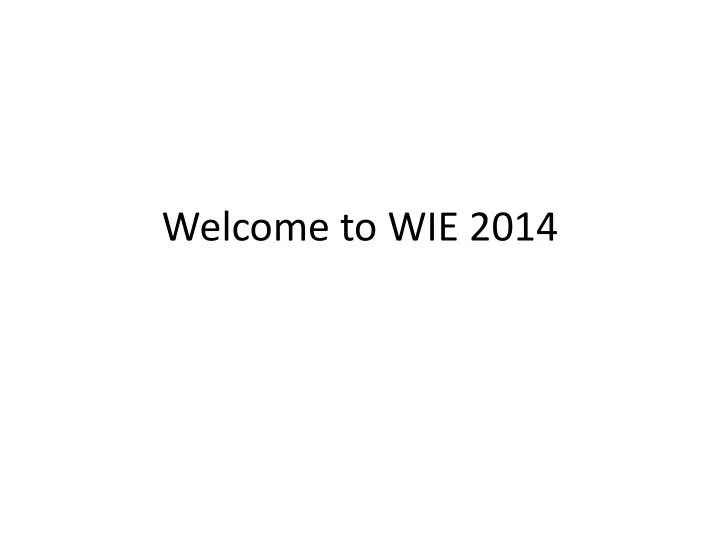

Welcome to WIE 2014
Aspirations and fears A discussion session at WIE David and kc
What should we worry about? • Current debates about regulation focus on the particulars of U.S. law: whether Title II or Section 706 is the better of two bad alternatives. • Lots of folks have observed that in the long run, we will need a “new Title”. • But before talking about law, lets talk about what problem we are trying to solve. • What might actually go wrong with the future of the Internet?
Aspirations • A while back, kc and I collected a list of “aspirations” about the Internet—a set of desirable outcomes that one or another actor has put forward. • We have listed these on the next slides. • But every aspiration can be stated in positive or negative terms: what we want, or the failure to achieve it. • Let’s be pessimistic and think about bad outcomes.
Reach • – The Internet should reach to every person by some means. Ubiquity • – The Internet should be available to us everywhere. Evolution • – The Internet should continue to evolve to match the pace and direction of the larger IT sector. Uptake • – The Internet should be used by more of the population. Affordable • – Cost should not be a barrier to the use of the Internet. Trustworthy • – The Internet should provide experiences that are sufficiently free of frustration, fears and unpleasant experiences that people are not deterred from using it. Lawful • – The Internet should not be an effective space for law-breakers.
National security • – The Internet should not raise concerns about national security Innovation • – The Internet should be a platform for vigorous innovation, and thus a driver of the economy. Generality • – The Internet should support a wide range of services and applications. Unblocked • – Internet content should be accessible to all without blocking or censorship. Choice • – The consumer should have choices in their Internet experience. Redistribution • – The Internet should serve as a mechanism for the distribution of wealth among different sectors and countries.
Unification • – The Internet (and Internet technology, whether in the public net or not) should become a unified technology platform for communication. Local values • – For any region of the globe, the behavior of the Internet should be consistent with and reflect its core cultural/political values. Universal values • – The Internet should be a tool to promote social, cultural, and political values, especially universal ones. Global • – Internet should be a means of communication between citizens of the world.
Our group exercise • Using this list to stimulate your thinking (or not, as you choose), tell us your top one to three fears about how the future Internet might “go off the rails”. • What bad outcomes are we trying to avoid? – Then we can discuss tomorrow if there is a way society (law, regulation, etc.) can intervene to reduce the possibility of this outcome. • Inhibit bad behavior? • Encourage new innovation—technology, business structure, etc? • Before tonight, go to https://www.surveymonkey.com/s/XKZPDPS and fill in a very simple survey. Do it more than once—once for each fear you want to put on the list.
A cross-check • Did we miss any aspirations? • What are the multi-stakeholder activities talking about? – IGF – NETmundial • Textual analysis by Cecilia Testart – RA in my group. – Thank you…
Human rights • Privacy • Censorship • Surveillance • Freedom of expression • Public interest • Access to information • Displaced People • Online Child Safety
Growth and development • Developing countries gap • Open Data Internet & Jobs • Small Island Developing States • The Role of IXPs • Intermediary Liability * • Gender • Digital Divide • Innovation • Content
Public Internet Access • Role of governments • Role of markets • Public Access in libraries • Infrastructure sharing • Funding & Affordability • Multi-Stakeholder Engagement • Access in Developing Countries • Connecting the Continents Through Fiber Optic • Open and distributed architecture • Culture and Linguistic Diversity
Network neutrality • Freedom of expression • Competition • Consumer choice • Meaningful transparency • Appropriate network management Infrastructure • Zero rating
Internet governance • Multistakeholderism • Evolution, Failed and successful mechanisms • ICANN • ITU, UNESCO, UNGA, WSIS & Intergovernmental organizations • Accountability & Misuse • IG Transparency and Openness • Openness Technical/Non-Technical community Bottom up approach • Consensus driven Engagement • Net Mundial / IGF
ICANN transition • ICANN accountability mechanisms • Relationship with the US government • ICANN globalization • Timeline • Global acceptance • Public interest
One more candidate aspiration • Incentive – Law and regulation should provide positive incentives for the actors in the Internet ecosystem to play their roles.
Recommend
More recommend